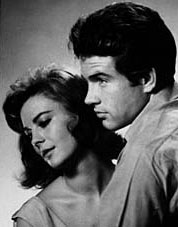Splendor in the Grass won an Oscar for best original screenplay, and netted Natalie Wood a nomination for best actress. Set in the late 1920’s, the movie presents us with high school sweethearts Bud and Deanie (who came up with these names?) played by very young versions of Warren Beatty and Ms. Wood.
From the start, they are caught up in a feverish, all-consuming passion which, under the moral constraints of the time, they dare not consummate. The movie unfolds like a Greek tragedy and, before it’s over, this great love is destroyed beyond recovery, Natalie Wood descends into madness and winds up in an asylum, and the 1929 stock market crash takes its own ruinous toll. It’s hard to overstate the level of bleakness here.
Perhaps it was because it was late at night and I was alone and particularly susceptible, and had no idea what I was in for, but the movie drew me in heart and soul and left me practically inconsolable for days.
At the end of Splendor in the Grass, Bud and Deanie meet one last time after several years. He’s married to someone else, and she is engaged. When Deanie asks Bud if he’s happy now, he answers: “I guess so. I don't ask myself that question very often, though.” Bud in turn wishes Deanie happiness in her upcoming marriage, and she responds, “Well, like you, Bud, I don't think too much about happiness either.” Bud agrees, “What's the point? You gotta take what comes.”
I remembered this scene almost verbatim, and to me it was achingly sad. These two will probably be married to decent enough people and live out their quiet lives, but their one chance at happiness together is gone forever. So, it’s best just not to think too much about it.
The only hope offered by the movie is found in lines from the Wordsworth poem “Ode: Intimations of Immortality from Recollections of Early Childhood” from which the movie’s title is taken: sometimes, you have to let go.
What though the radiance which was once so bright
Be now for ever taken from my sight,
Though nothing can bring back the hour
Of splendour in the grass, of glory in the flower;
We will grieve not, rather find
Strength in what remains behind. . . .
So, anyway, some 30 or more years later, never having seen it since, I get this great idea to rent the movie from Netflix and let it work its melancholy magic on me all over again. Unfortunately, things didn’t quite work out as planned.
The acting was nowhere near as powerful as I remembered it, and seemed stilted and at times a bit over the top. I also realized that there was no effort whatever to try to re-create the clothing, hairstyles and manners of the 20’s and 30’s; instead, the movie was content to let everyone remain in contemporary styles of 1961. Maybe people of the 60’s didn’t notice this, but I sure did. And this overpowering love? Bud and Deanie seemed more in love with the idea of being in love than they were with each other. There was plenty of lust but not much chemistry. On top of that, despite her mental illness and institutionalization, Natalie Wood at all times remained nattily dressed, and never failed to look terrific, even in the deepest pits of despair. There were still some powerful scenes and the unbridgeable gap between parents and their children was painfully real, but overall it seemed like a lot of the air had been let out of the movie’s emotional wallop.
So, now I know the danger of seeing old favorites. My wonderful memory of this film, which I use to dwell on and force upon others from time to time, has now become hopelessly unraveled. I’ll never be able to enjoy those recollections in quite the same way again.
The funny thing here is that my disappointment in the movie underscored the very point the movie was out to make: that there are peak moments in life that you just can’t get back to. It’s tragic, but they’re gone. I’ll never have that exquisite, bittersweet pleasure of being hit over the head and laid waste by this movie again.
I’m left with Wordsworth’s advice: grieve not, rather find strength in what remains behind.



3 comments:
That's why I have resisted renting The Neptune Factor, Winterhawk, and Mother Jugs and Speed.
With advice from my Dan, I have resisted re-watching the Dark Crystal, a classic from my childhood, but by all accounts is actually a terrible movie.
I think I may have to re-watch my old favorites. I fear that I have been recommending terrible movies to a lot of people and they will no longer trust my movie judgment.
Wait...scratch that, all the movies I love are terrible and I have always lacked the reputation as a good movie critic, oh Evil Dead III how I love the.
Post a Comment